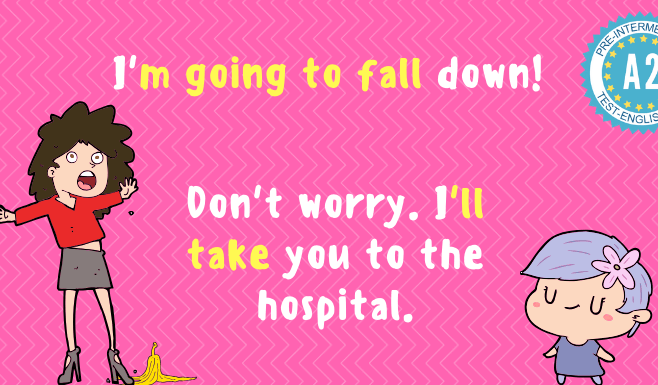There are some differences between these three ways of talking about the future. The differences are not always important; often we can use two or three different forms to talk about the same thing.

PREDICTIONS
Going to: we can see the future in the present; we see things coming or starting:
Look out! You’re going to break that glass! (I can see it now.)
Will: we think or believe things about the future:
Don’t give him a watch – he‘ll break it. (I think so, because I know him.)
Practice I: What’s the best form?
- Perhaps we are going to / will meet again one day.
- Look! Andy is going to / will fall off his bike!
- I think you are going to / will love Paris.
- Look at those clouds: it‘s going to / will rain.

DECISIONS
Will: we are making decisions; spontaneous decisions made at the time of speaking:
‘We’ve got a letter from Jan.’ ‘Ok, I‘ll answer it.‘
Going to: decisions are already made; decision made before the time of speaking:
‘There are a lot of letters to answer.’ ‘I know. ‘I‘m going to do them all on Tuesday.’
Practice II: Which one: I’ll or I’m going to?
- I’ve decided (that) ……………… stop smoking.
- ‘I don’t want to cook tonight.’ ‘All right, then. ……..cook.’
- ‘I haven’t got any money.’ ‘No? OK. ………….. pay.’
- ‘Do you want to go out tonight?’ ‘No, ………….. study English.’
- ‘These pants are dirty.’ ‘Really? Oh, yes, they are. …………. wash them.’
- ‘Is Ann eating with us?’ ‘Wait a minute. ………….. ask her.’
PLANS AND ARRANGEMENTS
Going to and the present progressive are often both possible when we talk about plans.
We use the present progressive mostly for fixed plans with a definite time and/or place:
I‘m going to see Ann sometime soon.
I‘m meeting Ann at the theater at 8 pm.
Sarah‘s starting university on September 17.
Practice III: In three of these sentences, the present progressive is possible. Which three?
- Jack is going to arrive at 4 pm.
- I’m going to learn French one of these days.
- I’m going to fly to Paris next year.
- Mom’s going to tell me about her problems.
- We’re all going to spend this month in Brazil.
- Are you going to answer all those emails?
ANSWERS:
PRACTICE I: 1. will; 2. is going to; 3. will; 4. is going to
PRACTICE II: 1. I’m going to; 2. I’ll; 3. I’ll; 4. I’m going to; 5. I’ll; 6. I’ll
PRACTICE III: 1. Jack is arriving at 4.00.; 3. I’m flying to Paris next year.; 5. We’re all spending this month in Brazil.
Here is a clear, simple, focused, and entertaining video that supports what we’ve learned.
Now practice will and going to a little more. In which sentences the present progressive is possible?
Lesson from The Good Grammar Book, Michael Swan and video transcript.
